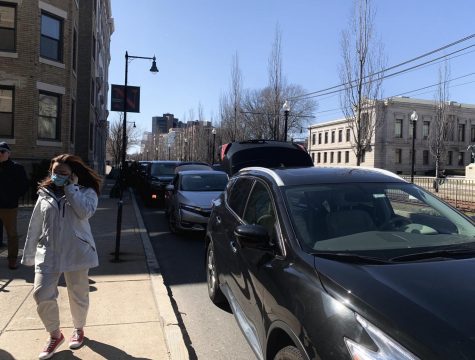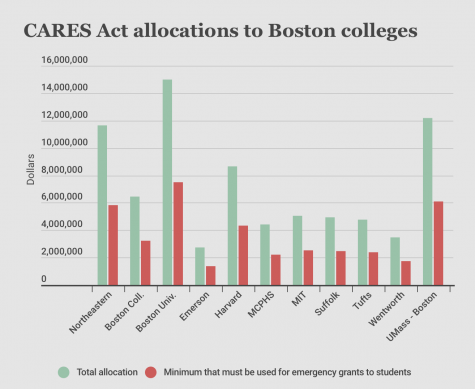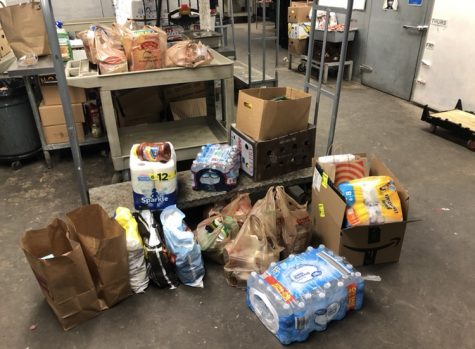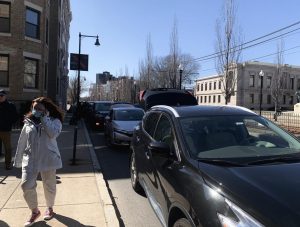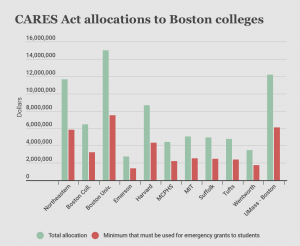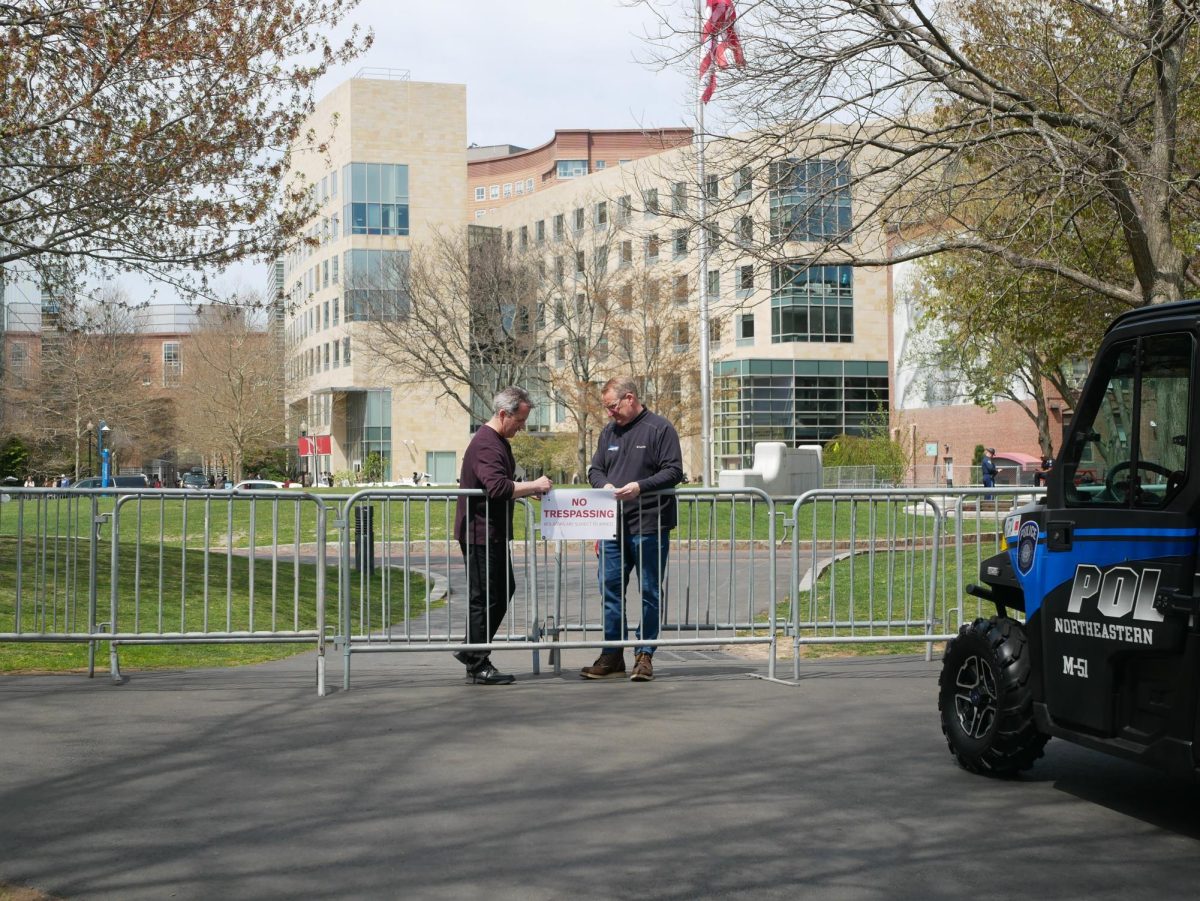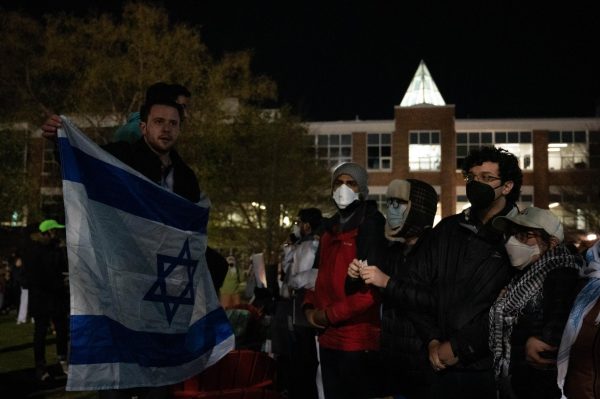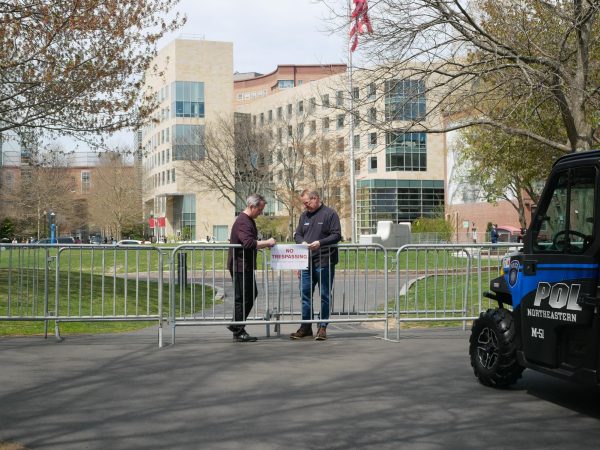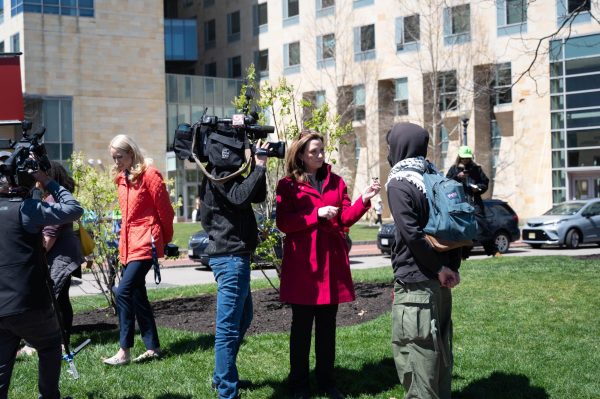Live updates: Northeastern and COVID-19
March 17, 2020
This story will be updated continually as new information comes from the university and elsewhere that pertains to Northeastern students.
4:45 p.m. June 11: Northeastern details NUflex program
All classrooms will be equipped with new, advanced cameras and microphones to improve the quality of remote learning. Cameras will automatically pivot to and zoom in on the speaker, while a camera in the back of the room can be configured to follow faculty as they move. Both students and faculty will have the opportunity to share screens. This is a substantial change from the university’s current online learning model, which currently relies on static webcams and traditional video conferencing via applications such as Zoom.
Accommodations will be made for classes that generally require hands-on learning, such as arts-based classes, science labs and health science training. Details are still unclear, but faculty expect to provide more information as the semester approaches.
Read our full coverage here.
7:20 p.m. June 5: Northeastern announces ‘NUflex’ hybrid learning model
After much uncertainty regarding the fall semester, Northeastern University announced their learning plan for the fall semester, a hybrid learning model titled NUflex.
In an email to the Northeastern community Friday evening, Chancellor and Senior Vice President for Learning Kenneth W. Henderson and Provost and Senior Vice President for Academic Affairs David Madigan described NUflex as “an exciting hybrid-flexible learning experience available for all Northeastern classes this fall.”
NUflex will give students the option to attend physical classes on campus or connect virtually through technology that allows for communication via audio, text and video. Remote students will be able to see, hear and interact with the instructor and classmates in real-time, as well as access additional teaching tools such as a whiteboard or projection screen. The classes will also be recorded and available to watch later.
Read our full coverage of the update here.
12:50 p.m. June 2: Northeastern reveals preliminary details for testing, housing, dining in the fall
Northeastern has provided new information on the fall reopening, under the Frequently Asked Questions page on the reopening website. The university did not actively announce this information, and it is unclear exactly when the website was updated.
The new information includes updates on:
COVID-19 testing and health
- Northeastern plans to have its own testing program with the capacity to administer thousands of tests per day. The website reads, “All students, faculty, and staff returning to campus will be required to undergo viral testing regularly.”
- If a member of the Northeastern community tests positive for COVID-19, the university will report the results to public health authorities and activate the university’s contact tracing team to alert individuals at risk. Students who live in residence halls and test positive will be asked to live in dedicated isolation housing for 14 days. Faculty and staff will be asked to isolate at home.
- Campus buildings will be disinfected four times as frequently as in the past, and in some cases, even more frequently. Hand sanitizer stations will be installed at “building entrances, offices, classrooms, labs, and other high-traffic areas.”
- Everyone on campus will be required to wear face masks at all times, both indoors and outdoors, “until further notice.”
Campus housing and dining
- Bedrooms in residence halls will be limited to no more than two people, and changes will be made to communal spaces and bathrooms.
- No visitors will be allowed in residence halls, and access will only be permitted to those who live in the building.
- The university will stagger access to dining halls and may limit access to take-out only.
5 p.m. May 20: NU releases safety protocols for initial reopening of research labs, administrative offices
Northeastern provided details on its summer campus reopening, starting with the phased return of a small number of faculty, staff and student researchers to labs and administrative offices “in the coming days.”
In an email to students, Chancellor Kenneth Henderson wrote that the first group of people to return to campus will be those who work in critical research labs and administrative staff who do work that is “difficult to perform effectively from off campus.” In the first phase of reopening, no building, lab or workplace will exceed 25 percent capacity.
Read our full coverage of the update here.
May 18: Masters student Manisha Bahrani files suit against Northeastern, marking second class action suit against the university
Northeastern University masters student Manisha Bahrani became the second student to file a class action suit against the university on May 18. The suit alleges a breach of contract and unjust enrichment on the part of the school for continuing to collect full tuition payments after transitioning to remote learning.
Bahrani alleges that Northeastern has failed to provide “the educational services, facilities, access and/or opportunities that Ms. Bahrani and [other students] contracted and paid for,” after moving to online classes March 11 in response to the coronavirus pandemic.
“The online learning options being offered to Northeastern students are subpar in practically every aspect, including the lack of facilities, materials and access to faculty. Students have been deprived of the opportunity for collaborative learning and in-person dialogue, feedback and critique,” the suit says.
Bahrani’s suit seeks a refund equal to a prorated amount of tuition and fees proportionate to the time remaining in the spring semester, following March 11.
Two weeks ago, graduate student Manny Chong filed a similar suit against Northeastern, also seeking a partial tuition refund and alleging breach of contract and unjust enrichment. Like Chong’s suit, Bahrani’s case notes that Northeastern advertises its on-campus experiences on its website.
When asked for comment on the lawsuit, university spokesperson Shannon Nargi said in an email to The News, “We are aware of the complaints and we will respond through the court process when appropriate. It is important to note that all colleges and universities moved classroom instruction online this spring in compliance with public health requirements.”
10:30 a.m. May 8: Northeastern announces plan to reopen classrooms, residence halls in the fall
Northeastern President Joseph E. Aoun announced in a university-wide email that senior administrators plan to return staff and faculty to their offices, resume in-person teaching with modifications and reopen residence halls for the fall semester.
“To put things in very clear terms: It is our intention to reopen our campuses this fall and offer on-site instruction and a residential experience for our students,” Aoun wrote in the email.
Read our full story on the update here.
May 1: Graduate student Manny Chong files lawsuit against Northeastern
Northeastern graduate psychology student Manny Chong filed a class action lawsuit against Northeastern University, alleging that the university breached its Financial Responsibility Agreement with students, which all students must sign before classes begin each fall.
The contract states students who “pay all tuition, fees and other associated costs assessed as a result of my registration and/or receipt of services” are entitled to “educational services,” which Chong alleges are now “inferior” since the transition to online classes due to the COVID-19 pandemic. The phrase “educational services” is not defined in the contract, the suit says.
Read our full story about the lawsuit here.
3:15 p.m. April 24: Northeastern opens application for CARES Act grants
Northeastern announced new information Friday about the funds allocated to the university by the CARES Act, including who can apply for grants and what they can be used for.
In an email sent to students, staff and faculty, Chancellor Kenneth Henderson stated that the university will begin reviewing applications as soon as possible, but didn’t set a specific date.
With exceptions, students enrolled at the time of the pandemic are eligible to apply for aid, and can complete a short online application to request emergency financial assistance.
According to the U.S. Department of Education, grants cannot be given to international students, students protected under Deferred Action for Childhood Arrivals (DACA), students enrolled exclusively in online programs as of March 13, 2020, or students enrolled in certificate programs.
Further information about eligibility and the application process can be found here. The funds are intended to pay for a wide range of expenses brought on by the COVID-19 pandemic including food, housing, travel, child care and other disruptions caused by the virus. Grants can range from $50 to the federally-recommended maximum of $6,195, however, students can request more than the recommended-maximum for exceptional circumstances.
Read our story about how the CARES Act applies to Northeastern here.
Northeastern President Joseph E. Aoun announced Tuesday that he would give part of his salary to student aid grants and COVID-19 research. University spokesperson Shannon Nargi told The News that this money is not related to the money available through this application. She did not specify what how money contributed by Aoun and other university leaders will be allocated.
11 a.m. April 21: Aoun to give part of salary to COVID-19 relief efforts
Northeastern President Joseph E. Aoun announced Tuesday that he will contribute 20 percent of his annual salary to emergency aid grants for students and research related to COVID-19. Aoun’s salary is just over $1.45 million. In an email to faculty and staff, he wrote that university vice presidents and academic deans will each contribute 10 percent.
10 p.m. April 15: Northeastern releases details of N.U.in Boston program
In response to concerns about international travel during the COVID-19 pandemic, Northeastern added a Boston location to its N.U.in program. In the past, all students admitted to the program spent their first semester of college abroad. Now, all admits will be offered the option of heading to Boston in September instead.
Their experience will not be exactly the same as the rest of the first-years at the Boston campus. There are key differences in academics and housing. Read our full summary of the university’s plans here.
3 p.m. April 11: Northeastern updates policy to allow students to record all classes pass/fail
The university updated its pass/fail grading policy Saturday in response to the disruption caused by the COVID-19 pandemic. In an email, Provost James C. Bean wrote that students can now request to have any of their courses recorded as pass/fail if they make such requests by April 14.
On March 20, the university announced that students could request for up to two courses to be recorded as pass/fail. Saturday’s update expanded the course allowance, but did not extend the deadline. Students still must make their decisions before final grades are known.
“Some students and families are enduring remarkable hardships caused by the COVID-19 pandemic,” Bean wrote in the email. “To address these issues, we will allow undergraduate students to take some or all courses pass/fail this semester.”
He wrote that summer courses, which will all be held online due to the pandemic, will return to the “normal” grading rules.
In an email to students Friday, Student Body President Chris Brown wrote that the SGA is urging the university to go further than the March 20 policy change, specifically to allow students to request pass/fail for all courses and to extend the deadline until after final grades are known. The student senate voted 32-4 on April 6 to call for these measures.
Brown wrote that students with concerns about the limitations of the university’s current policy should contact the provost’s office.
10:45 a.m. April 7: Northeastern waives standardized test requirements for 2021-22 applicants
The COVID-19 pandemic’s impact on Northeastern’s operations has already been profound. With the university’s announcement Monday that graduate and undergraduate applicants for the 2021-22 school year may apply without standardized test scores, it’s clear that the effects will be felt for years to come.
“Students applying to programs that traditionally require the SAT, ACT, GRE, GMAT, or MAT will not be required by the university to supply the results of those tests, although they are welcome to submit scores voluntarily,” read an article on News@Northeastern, the university’s proprietary media outlet.
The decision came after many opportunities to take these exams were cancelled in the spring.
“We are confident that the move to test-optional will result in an applicant pool that still reflects the depth of students’ academic records, contributions to their communities, and full range of experiences,” said Sundar Kumarasamy, vice president for enrollment management, to News@Northeastern.
The new policy does not apply to the Northeastern University School of Law juris doctor program. Prospective students who are not native English speakers still must submit language exam scores to demonstrate proficiency or request a waiver.
3:30 p.m. April 2: Summer II classes moved to online delivery
Northeastern announced Thursday that Summer II courses, which take place mostly in July and August, will be delivered online due to the COVID-19 pandemic.
In an email to students at 3:30 p.m., Chancellor Kenneth Henderson and Senior Vice President for External Affairs Michael Armini wrote that the decision was “based on the continuing guidance from public health officials.”
The email did not indicate whether or not campus housing will be open for Summer II. Residence halls are closed at least through Summer I. The university previously announced that all Summer II Dialogue of Civilizations programs are cancelled.
11:55 a.m. March 27: Gov. Baker announces all travelers to Mass. must self-quarantine
Massachusetts Gov. Charlie Baker announced Friday morning that all travelers arriving in the state will be instructed to self-isolate for 14 days, effective immediately.
Instructions will be given at Boston Logan International Airport, South Station and Worcester Regional Airport. The directive will be displayed at highway rest stops and on message boards along the Turnpike.
“We’re taking extraordinary steps here to keep our residents safe,” Baker said, “including asking folks to stay home and closing nonessential businesses … At the same time we’re asking so much of our residents, we should also be thinking about the potential impact of travellers visiting Massachusetts from other places.”
Baker urged travelers to comply in order to protect “the most vulnerable among us all” from potential infection.
Baker, a Republican, announced the new measures not long after President Donald J. Trump began stressing in news conferences and FOX News appearances that parts of the country should soon ease restrictions and “go back to work.”
On top of the quarantine requirement, Baker suggested that out-of-state residents shouldn’t come to Massachusetts if they don’t need to.
“We’re asking that folks considering travel to Massachusetts for whatever reason do not travel to our communities, especially if you have symptoms,” Baker said. “Healthcare workers, public health workers, public safety workers and transportation workers are obviously exempt from this requirement.”
3:50 p.m. March 26: Petition to pay dining hall workers has 5,200 signees; Chartwells laid off most
A Change.org petition urging Northeastern to ensure that its dining hall workers continue to be paid during the indefinite shutdown has gathered more than 5,200 signatures as of Thursday afternoon. Most campus dining locations have been shut down since March 18 due to the COVID-19 pandemic, as all classes were moved to online instruction and campus housing closed.
According to a March 25 report in the Boston Globe, Northeastern has made no plans to continue paying dining workers. One dining worker told the Globe that when workers were told they were laid off, they were given a bag of onions, potatoes and bread, along with instructions on how to file for unemployment.
Northeastern spokesperson Renata Nyul told the Globe that this matter is between the employees and the school’s dining contractor, Chartwells. On Thursday, the Massachusetts Institute of Technology announced it would continue paying its dining hall workers for 30 days, including subcontractors.
The petition specifically calls for Northeastern to pressure Chartwells to pay the affected workers. Northeastern has historically taken a passive role in disputes between dining hall workers and Chartwells; when the workers’ union voted to strike in 2017, a university spokesperson said Northeastern had no say in the matter.
6:40 p.m. March 23: Northeastern reduces employee presence on Massachusetts campuses
All non-essential staff must now work remotely effective from noon on Tuesday until noon on April 7 at Northeastern’s Massachusetts campuses. Employees were deemed “on-site essential” by their individual managers and were notified of this decision by email. This email contained a letter that employees can show to campus security to allow them entrance to campus. All other employees were told to collect any necessary belongings from campus by noon on Tuesday.
Among these essential employees are researchers, including doctoral students, conducting critical research. “Most of the university’s research enterprise—particularly research related to COVID-19—will maintain continuity,” wrote Kenneth Henderson and Michael Armini, the co-chairs of the university COVID-19 task force.
Northeastern directed employees with questions about their status to their individual supervisors. This notice did not change the current remote work policy in effect for Northeastern employees who have already been told to work from home.
3:40 p.m. March 20: Pass/fail option for up to two courses announced
Undergraduate students can choose to take up to two courses as pass/fail in the Spring 2020 semester due to the ongoing novel coronavirus pandemic, according to an email sent out to all faculty, staff and students at Northeastern Friday afternoon.
The choice on which courses is up to the students, but “all Spring 2020 undergraduate courses are eligible for Pass/Fail, including those being used to satisfy major and minor requirements, and to fulfill NUpath requirements,” wrote James C. Bean, the provost and senior vice president for academic affairs.
Bean also acknowledged that this option does not extend to the graduate school, law school or College of Professional Studies students.
Undergraduate students must make this choice by April 14, an extension from the previous date, which already passed.
Many other Boston universities have also adopted the pass/fail option, including MIT and Boston College.This decision comes after a petition was signed by more than 1,200 students. It was widely shared on social media platforms including Reddit, Instagram and in Northeastern Facebook groups.
10:30 p.m. March 19: All Summer II Dialogue of Civilizations programs cancelled
The COVID-19 pandemic impacted university operations beyond Summer I for the first time: The university announced Thursday evening that all Summer II Dialogues will be cancelled or delivered virtually.
In a brief email, Chancellor Kenneth Henderson and Senior Vice President for External Affairs Michael Armini wrote that the Global Experience Office will work with faculty to determine which programs can be held online. Henderson and Armini are co-chairs of the University COVID-19 Task Force.
“We are saddened by the impact of the COVID-19 pandemic on global experiential opportunities,” they wrote. “However, the health and well being of our students, faculty, and staff remain our first priority.”
The university previously announced that all Summer 1 courses will be held online and campus housing will remain closed through at least Summer I. This is NU’s first announcement regarding Summer 2 operations.
2:27 p.m. March 19: Students with on-campus jobs will continue to be paid
The university informed students on Tuesday that it would continue to pay students employed on campus in work-study, part-time or co-op roles through the end of the spring semester, even if they are unable to work due to the COVID-19 pandemic.
“The university will continue paying students, regardless of funding type or position, until the end of the academic term for which they are scheduled to work,” read a Tuesday email from the Student Employment Office sent to affected students. “We ask that you continue submitting time sheets in accordance with your normal schedule.”
Payroll deadlines will remain the same and supervisors will continue reviewing and approving hours. The Student Employment Office will be staffed Monday from 8:30 a.m. to 7 p.m., and Tuesday through Friday from 8:30 a.m. to 5 p.m. All payments must be done through direct deposit.
1:37 p.m. March 17: 2020 commencement will be held virtually
Northeastern announced Tuesday what 2020 graduates have feared and suspected for more than a week: Due to the COVID-19 pandemic, the 2020 commencement ceremony will be held virtually instead of inside TD Garden. In an email sent to all students Tuesday afternoon, President Joseph E. Aoun expressed a desire to make the virtual ceremony as much of a celebration as possible for the class of 2020.
“While we cannot be together in person this year, we will mark Northeastern’s 118th Commencement in every way open to us, beyond a single day or event,” Aoun wrote.
The online ceremony will be on May 1. It will feature a commencement speaker as usual, though Aoun didn’t name one in the email. He mentioned that the university will plan events around the world to celebrate 2020 graduates once it is safe to do so.
8:15 a.m. March 17: Changes to Summer I term, other updates
Northeastern announced in an email to students Tuesday morning that Summer I will be impacted in the same manner as the current spring semester. University housing will remain closed through the end of Summer I, and all Summer I courses will be held online. That email was brief and did not specify if any courses will be canceled or drastically altered in light of this change.
The university also used the email to encourage students in off-campus housing to return to their homes outside of Boston. This will not be enforced by the university. Many students have remained in off-campus housing, and many on-campus residents turned to nearby apartments as vital options as they had to find new arrangements on the fly.
The email, written by Chancellor Kenneth Henderson and Senior Vice President for External Affairs Michael Armini, indicated that all co-op employers have been contacted by NU and that students forced to cut their co-op experience short because of the crisis will receive credit.
The message also noted that the university’s research enterprise will continue to operate and PhD students may remain, while observing social distancing recommendations.
Students can have any mail that was sent to an on-campus mailbox forwarded by emailing [email protected].


